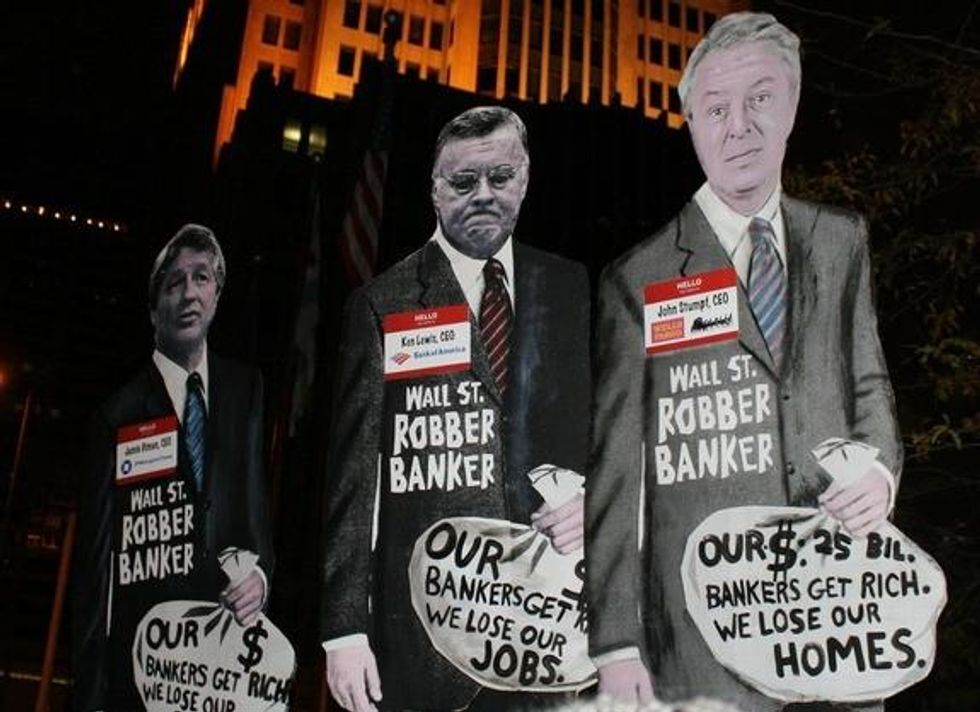Wall Street's Bonus Bonanza Continues
Report highlights outsized bonuses more than twice total earned income by all minimum wage workers

According to report author Sarah Anderson, director of the Global Economy Project at the Institute of Policy Studies, if that $26.7 billion was instead paid to minimum wage workers, the economic ripple effect would have grown the United State's Gross Domestic Product by about $32.3 billion.
Low-wage workers tend to spend nearly every dollar they make to meet their basic needs, such as on groceries or utilities. "Every extra dollar going into the pockets of low-wage workers, standard economic multiplier models tell us, adds about $1.21 to the national economy," Anderson explains.
By contrast, she notes, every extra dollar pocketed by high-income Americans--who "can afford to squirrel away a much greater share of their earnings"--only adds about 39 cents to the GDP.
The average Wall Street bonus jumped 15 percent this year to $164,530, the highest amount since the 2008 financial crash, according to an annual estimate released Wednesday by the New York state comptroller.
According to financial watchdog groups, these outsized bonuses were one of the major contributing factors to the crash as they create an incentive for high-risk speculation that jeopardizes the entire economy.
"Low-wage jobs, on the other hand, endanger nothing," Anderson continues. "The people who harvest, prepare, and serve our food, the folks who keep our hotels clean, and the workers who care for our elderly all provide crucial services. They deserve much higher rewards."
_____________________
An Urgent Message From Our Co-Founder
Dear Common Dreams reader, The U.S. is on a fast track to authoritarianism like nothing I've ever seen. Meanwhile, corporate news outlets are utterly capitulating to Trump, twisting their coverage to avoid drawing his ire while lining up to stuff cash in his pockets. That's why I believe that Common Dreams is doing the best and most consequential reporting that we've ever done. Our small but mighty team is a progressive reporting powerhouse, covering the news every day that the corporate media never will. Our mission has always been simple: To inform. To inspire. And to ignite change for the common good. Now here's the key piece that I want all our readers to understand: None of this would be possible without your financial support. That's not just some fundraising cliche. It's the absolute and literal truth. We don't accept corporate advertising and never will. We don't have a paywall because we don't think people should be blocked from critical news based on their ability to pay. Everything we do is funded by the donations of readers like you. Will you donate now to help power the nonprofit, independent reporting of Common Dreams? Thank you for being a vital member of our community. Together, we can keep independent journalism alive when it’s needed most. - Craig Brown, Co-founder |

According to report author Sarah Anderson, director of the Global Economy Project at the Institute of Policy Studies, if that $26.7 billion was instead paid to minimum wage workers, the economic ripple effect would have grown the United State's Gross Domestic Product by about $32.3 billion.
Low-wage workers tend to spend nearly every dollar they make to meet their basic needs, such as on groceries or utilities. "Every extra dollar going into the pockets of low-wage workers, standard economic multiplier models tell us, adds about $1.21 to the national economy," Anderson explains.
By contrast, she notes, every extra dollar pocketed by high-income Americans--who "can afford to squirrel away a much greater share of their earnings"--only adds about 39 cents to the GDP.
The average Wall Street bonus jumped 15 percent this year to $164,530, the highest amount since the 2008 financial crash, according to an annual estimate released Wednesday by the New York state comptroller.
According to financial watchdog groups, these outsized bonuses were one of the major contributing factors to the crash as they create an incentive for high-risk speculation that jeopardizes the entire economy.
"Low-wage jobs, on the other hand, endanger nothing," Anderson continues. "The people who harvest, prepare, and serve our food, the folks who keep our hotels clean, and the workers who care for our elderly all provide crucial services. They deserve much higher rewards."
_____________________

According to report author Sarah Anderson, director of the Global Economy Project at the Institute of Policy Studies, if that $26.7 billion was instead paid to minimum wage workers, the economic ripple effect would have grown the United State's Gross Domestic Product by about $32.3 billion.
Low-wage workers tend to spend nearly every dollar they make to meet their basic needs, such as on groceries or utilities. "Every extra dollar going into the pockets of low-wage workers, standard economic multiplier models tell us, adds about $1.21 to the national economy," Anderson explains.
By contrast, she notes, every extra dollar pocketed by high-income Americans--who "can afford to squirrel away a much greater share of their earnings"--only adds about 39 cents to the GDP.
The average Wall Street bonus jumped 15 percent this year to $164,530, the highest amount since the 2008 financial crash, according to an annual estimate released Wednesday by the New York state comptroller.
According to financial watchdog groups, these outsized bonuses were one of the major contributing factors to the crash as they create an incentive for high-risk speculation that jeopardizes the entire economy.
"Low-wage jobs, on the other hand, endanger nothing," Anderson continues. "The people who harvest, prepare, and serve our food, the folks who keep our hotels clean, and the workers who care for our elderly all provide crucial services. They deserve much higher rewards."
_____________________

